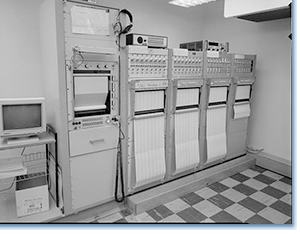With the recent proliferation of the digital humanities (DH) in and outside the academy, we thought it might be useful to draw attention to the kinds of projects historians are developing. The National Endowment of the Humanities Office of Digital Humanities (NEH-ODH) has been an early and substantial supporter of projects and workshops across the DH community, so it made sense to look at the recent round of NEH-ODH grantees as a way of highlighting recent work by historians.
True to the nature of DH, many of the projects are broadly applicable to scholarship in the humanities, rather than just history, particularly those that construct platforms or environments for data and artifact sharing, analysis, and publication. We’ve focused on a few that were either specifically designed by historians or with an obvious application to historical studies, but we encourage you to view the full range of past and present grants at the NEH-ODH site and explore some of the other projects for possible intersection with your own interests and research.
Digital Humanities Start-Up Grants, which we are featuring here, are smaller grants for projects that are still in the planning or prototype stage. Wherever possible, we have used the text from the grantees description.
Digital Prosopography for Renaissance Musicians: Discovery of Social and Professional Networks
Johns Hopkins University (Baltimore, MD 21218)
Susan Forscher Weiss (project director) and Ichiro Fujinaga (co-project director)
We will investigate the applicability of FOAF (Friend of a Friend), for describing relationships between musicians of the past, thereby establishing a new biographical tool. The grant supports the continued development of a prosopographical database tracing the social and professional networks of Renaissance musicians, using automated methods to identify individuals and biographical information within relevant sources and to establish relationships between them.
Project Andvari: A Digital Portal to the Visual World of Early Medieval Northern Europe Catholic University of America, Washington, DC
Lilla Kopar (project director) and Nancy L. Wicker (co-project director)
A workshop bringing together an international group of humanities scholars, cultural heritage professionals, and technical experts to begin planning for an online resource that would facilitate access to digital collections of the art and artifacts of the early medieval period in northern Europe, drawn from a range of dispersed institutional holdings.
The Pompeii Bibliography and Mapping Resource Project University of Massachusetts, Amherst, Amherst, MA
Eric Eagan Poehler, Project Director The Pompeii Bibliography and Mapping Resource (PBMR) is a web-based research tool composed of three parts: 1. a bibliographic database and full-text document repository, 2. a Geographical Information System (GIS) and 3. a user interface. The grant supports further development of a web-based prototype platform that would allow researchers to access both geospatial and bibliographic information relevant to Pompeii.
Representing Early Black Film Artifacts as Material Evidence in Digital Contexts
Indiana University, Bloomington, Bloomington, IN
Brian Graney, Project Director
A scholarly workshop and follow up activities that will bring together film studies scholars, moving image archivists, and library professionals to consider how digitization of early motion picture film might be improved to better capture the physical attributes of the film print. The workshop would focus on early twentieth century films made for African American audiences.
Mobile Museum Initiative
Cleveland State University , Cleveland, OH
Mark Tebeau (project director) and Erin Bell (co-project director)
Development of a prototype of Curatescape Museums, a platform for mobile interpretation of museum collections, as well as best practices for small to mid-sized museums interested in implementing mobile technologies.
Traveling While Black
Independent Feature Project, New York, NY
Roger Ross Williams (project director) and Woo Jung Cho (co-project director)
A two-day workshop led by Games for Change that will result in the development of a proof-of-concept prototype for a game based on The Negro Motorist Green Book, first published in 1936 with advice for African Americans traveling in the Jim Crow South.
Uncovering Reprinting Networks in 19th Century American Newspapers
Northeastern University, Boston, MA
Ryan Cordell, Project Director; Elizabeth Maddock Dillon, Project Director; David Smith, Project Director
The development of models, using tools from computational linguistics, to help track the spread of prints and reprints of poetry and short stories throughout 19th century newspapers, using the sources found in the Chronicling America database of digitized newspapers.
Deadline for the next round of Digital Humanities Start-up Grants is September 12, 2013.
This post first appeared on AHA Today.
This work is licensed under a Creative Commons Attribution-NonCommercial-NoDerivatives 4.0 International License. Attribution must provide author name, article title, Perspectives on History, date of publication, and a link to this page. This license applies only to the article, not to text or images used here by permission.



